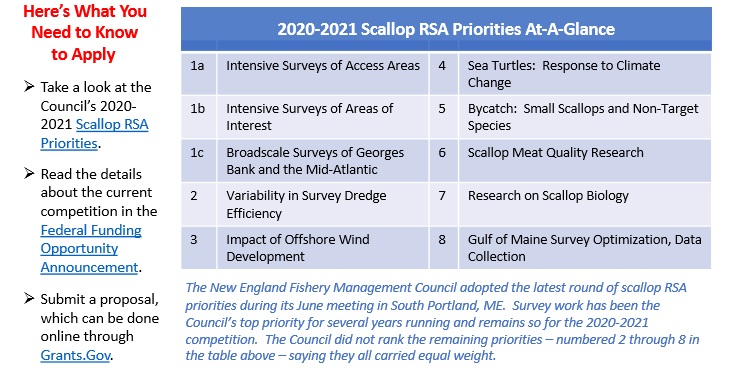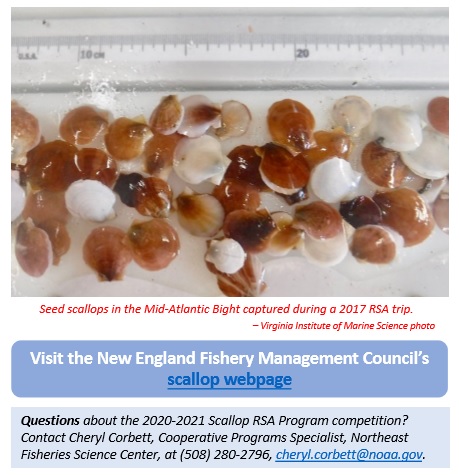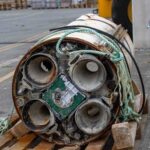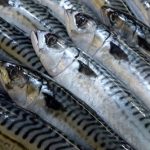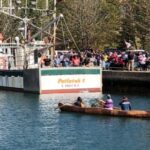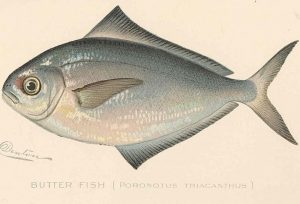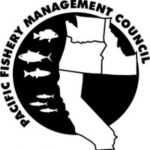2020-2021 Scallop RSA Competition Underway; September 20Deadline for Project Proposals
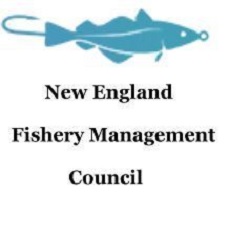
New England Fishery Management Council
FORIMMEDIATE RELEASE PRESS CONTACT: Janice Plante July 25, 2019 (607) 592-4817, [email protected]
New England Fishery Management Council | 50 Water Street, Mill 2 | Newburyport, MA 01950 Phone: (978) 465-0492 | Fax: (978) 465-3116 |
2020-2021 Scallop RSA Competition Underway; September 20Deadline for Project Proposals The federal competition for 2020-2021 awards through the Scallop Research Set-Aside (RSA) Program is now open. The deadline for submitting full proposals is Friday, September 20, 2019 at 5 p.m. The New England Fishery Management Council established the Scallop RSA Program under the Atlantic Sea Scallop Fishery Management Plan. The Council sets research priorities for this program, while the National Marine Fisheries Service (NMFS/NOAA Fisheries) administers the RSA competition, oversees award projects, and monitors set-aside harvest activities through the Northeast Fisheries Science Center and Greater Atlantic Regional Fisheries Office (GARFO).
1a Intensive Surveys of Access Areas 4 Sea Turtles: Response to Climate Change 1b Intensive Surveys of Areas of Interest 5 Bycatch: Small Scallops and Non-Target Species 1c Broadscale Surveys of Georges Bank and the Mid-Atlantic 6 Scallop Meat Quality Research 2 Variability in Survey Dredge Efficiency 7 Research on Scallop Biology 3 Impact of Offshore Wind Development 8 Gulf of Maine Survey Optimization, Data Collection 2020-2021 Scallop RSA Priorities At-A-Glance
No federal funds are provided for this industry-funded research. Instead, 1.25 million pounds of scallops are deducted from the fishery’s annual catch limit each year and are “set aside” to fund the RSA program. Successful applicants are awarded pounds of scallops to pay for research expenses. Projects are conducted through partnerships between fishermen and researchers, and proceeds from the sale of scallops harvested while carrying out the projects are used to fund the research and compensate fishing industry partners.
Projects funded through the Scallop RSA Program must enhance the Council’s understanding of the scallop resource or contribute to scallop fishery management decisions. The three survey types outlined below are equally weighted as the Council’s top 2020-2021 scallop research priority. More specifically, the Council is interested in:
• 1a. An intensive industry-based survey of each of the relevant scallop rotational areas –Closed Area I, Closed Area II, Nantucket Lightship, Elephant Trunk, and Hudson Canyon –that will provide estimates of total and exploitable biomass to be used for setting fishery catch limits under the rotational area management program. Areas proposed to be open the following fishing year generally have a higher priority than other areas.
• 1b. An intensive industry-based survey of areas of importance, such as open areas with high scallop recruitment or areas of importance to the fishery. For 2019, the priority areas are likely to be: (1) the Habitat Area of Particular Concern in Closed Area II and surrounds; (2) the area south of Closed Area II, which formerly was part of the Closed Area II Extension; (3) Delmarva; (4) areas off Long Island; and (5) areas of the Gulf of Maine that recently have been or are likely to be fished. And,
• 1c. A resource wide industry based survey of scallops within Georges Bank and/or Mid-Atlantic resource areas. The survey or surveys do not need to be carried out by a single grant recipient. The primary objective of these surveys would be to provide an added broadscale biomass index in addition to the federal survey to improve the overall precision of the scallop biomass estimate produced by the Scallop Plan Development Team.
Other Priorities
The Council has identified numerous other research priorities that cover issues ranging from scallop biology and meat quality to offshore wind impacts and survey dredge efficiency. Interested applicants are urged to read the details in the full Federal Funding Opportunity Announcement.
Seed scallops in the Mid-Atlantic Bight captured during a 2017 RSA trip. –Virginia Institute of Marine Science photo Questionsaboutthe2020-2021Scallop RSA Program competition? Contact Cheryl Corbett, Cooperative Programs Specialist, Northeast Fisheries Science Center, at (508) 280-2796, [email protected]






